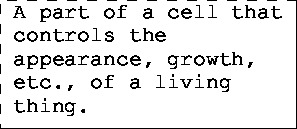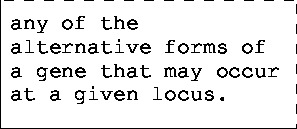

Learn about the process of cell transportation and genetic dispositions with these scientific flash cards.
There are 27 flash cards in this set (5 pages to print.)
To use:
1. Print out the cards.
2. Cut along the dashed lines.
3. Fold along the solid lines.
Sample flash cards in this set:




| Questions | Answers |
|---|---|
| Gene | A part of a cell that controls the appearance, growth, etc., of a living thing. |
| Allele | any of the alternative forms of a gene that may occur at a given locus. |
| Trait | A quality that makes one person or thing different from another. |
| Hybrid | An animal or plant that is produced from two animals or plants of different types. |
| Homozygous | Having the two genes at the corresponding loci on homologous chromosomes identical for one or more loci. |
| Heterozygous | Having the two allele at corresponding loci on homologous chromosomes identical for one or more loci |
| Transformation | A complete or major change in someone`s or something`s appearance, form, etc. |
| Bacteriophage | A virus that infects Bacteria. |
| Base Paring | To participate in formation of a base pair. |
| Replication | Copy, Reproduction. |
| DNA polymerase | Any of several polymerase that promote replication or repair of DNA usually using single-stranded DNA as a template. |
| Transcription | the process of constructing a messenger RNA molecule using a DNA molecule as a template with resulting transfer of genetic information to the messenger RNA. |
| Translation | the process of forming a protein molecule at a ribosomal site of protein synthesis. |
| Codon | a specific sequence of three consecutive nucleotides that is part of the genetic code. |
| Anticodon | a triplet of nucleotide bases in transfer RNA that identifies the amino acid carried and binds to a complementary codon. |
| Mutation | a change in the genes of a plant or animal that causes physical characteristics that are different from what is normal. |
| Selective breeding | Intentional breeding for a specific characteristic. |
| Genetic engineering | the science of making changes to the genes of a plant or animal to produce a desired result. |
| Restriction enzyme | any of various enzymes that cleave DNA into fragments at specific sites in the interior of the molecule |
| Gel electrophoresis | electrophoresis in which molecules migrate through a gel and especially a polyacrylamide gel and separate into bands according to size |
| Recombinant DNA | genetically engineered DNA usually incorporating DNA from more than one species of organism |
| Polymerase chain | an in vitro technique for rapidly synthesizing large quantities of a given DNA segment that involves separating the DNA into its two complementary strands. |
| Plasmid | an extrachromosomal ring of DNA especially of bacteria that replicates autonomously |
| Karyotype | the chromosomal characteristics of a cell |
| Pedigree | the history of the family members in a person's or animal's past especially when it is good or impressive |
| Nondisjunction | failure of homologous chromosomes or sister chromatids to separate subsequent to metaphase in meiosis or mitosis so that one daughter cell has both and the other neither of the chromosomes |
| DNA fingerprint | a technique used especially for identification by extracting and identifying the base-pair pattern in an individual's DNA |